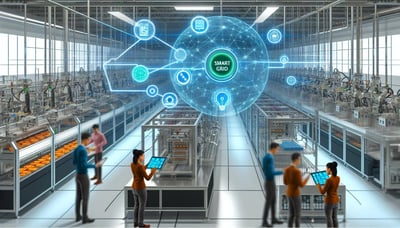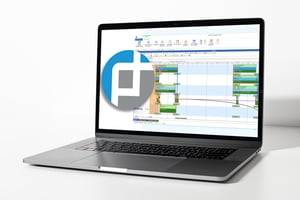Topics: PlanetTogether Software, Enhanced Supply Chain Visibility, Seamless Data Exchange, Integrating PlanetTogether, Improved Production Planning, Scalability and Flexibility, Food and Beverage Manufacturing, Smart Grid Integration
With consumers demanding higher quality products at lower costs, manufacturers are constantly seeking innovative solutions to streamline operations. One such solution gaining traction is smart grid integration. By harnessing the power of data and automation, smart grid integration offers a range of benefits for food and beverage manufacturers, from optimizing energy consumption to improving production scheduling.
In this blog, we'll explore the concept of smart grid integration and its potential impact on manufacturing IT in food and beverage facilities. We'll also look into the benefits of integrating solutions like PlanetTogether with leading ERP, SCM, and MES systems such as SAP, Oracle, Microsoft, Kinaxis, and Aveva.

At its core, smart grid integration involves the use of advanced technology to optimize energy usage within a manufacturing facility. Traditional energy systems operate on a one-way flow of electricity, with power generated centrally and distributed to consumers. In contrast, smart grids leverage two-way communication between suppliers and consumers, enabling real-time monitoring and control of energy usage.
For food and beverage manufacturers, smart grid integration offers several key advantages:
Energy Efficiency: By monitoring energy consumption in real-time, manufacturers can identify opportunities to reduce waste and optimize usage. This not only reduces costs but also minimizes the environmental impact of operations.
Demand Response: Smart grid technology allows manufacturers to participate in demand response programs, adjusting energy usage in response to fluctuations in supply and demand. This can lead to significant savings on utility bills and improve grid stability.
Predictive Maintenance: Smart grid systems can also facilitate predictive maintenance by analyzing energy usage patterns to identify potential equipment failures before they occur. This proactive approach helps minimize downtime and extends the lifespan of critical assets.
Enhanced Resilience: By diversifying energy sources and integrating renewable energy systems, smart grids can enhance the resilience of manufacturing facilities against power outages and other disruptions.

While the benefits of smart grid integration are clear, realizing its full potential requires seamless integration with existing manufacturing IT systems. This is where solutions like PlanetTogether, a leading production scheduling software, play a crucial role. By integrating PlanetTogether with ERP, SCM, and MES systems such as SAP, Oracle, Microsoft, Kinaxis, and Aveva, food and beverage manufacturers can unlock a host of additional benefits:
Improved Production Planning: By syncing production schedules with real-time energy data, manufacturers can optimize production workflows to minimize energy consumption during peak demand periods. This ensures efficient resource allocation and maximizes overall productivity.
Enhanced Supply Chain Visibility: Integrating production scheduling with ERP and SCM systems provides end-to-end visibility into the supply chain, allowing manufacturers to identify bottlenecks and optimize inventory levels. This enables more accurate demand forecasting and reduces the risk of stockouts or overstocking.
Seamless Data Exchange: With seamless integration between PlanetTogether and ERP, SCM, and MES systems, manufacturers can automate data exchange processes, eliminating manual errors and streamlining operations. This ensures that decision-makers have access to accurate, up-to-date information at all times.
Scalability and Flexibility: As manufacturing operations evolve, integrated systems offer scalability and flexibility to adapt to changing business needs. Whether scaling up production to meet increased demand or implementing new energy-saving initiatives, integrated solutions provide the agility required to stay competitive in a dynamic market.
Food and beverage manufacturers must embrace innovative solutions to drive efficiency and remain competitive. Smart grid integration offers a powerful tool for optimizing energy usage and streamlining production operations. By integrating solutions like PlanetTogether with leading ERP, SCM, and MES systems, manufacturers can unlock a range of benefits, from improved production planning to enhanced supply chain visibility.
Smart grid integration will play an increasingly important role in driving sustainability, resilience, and profitability in food and beverage manufacturing facilities. By embracing this technology and leveraging the power of integration, manufacturers can position themselves for success in the years to come.
Are you ready to take your manufacturing operations to the next level? Contact us today to learn more about how PlanetTogether and integrated scheduling solutions can help you achieve your sustainability goals and drive success in the food and beverage industry.
Topics: PlanetTogether Software, Enhanced Supply Chain Visibility, Seamless Data Exchange, Integrating PlanetTogether, Improved Production Planning, Scalability and Flexibility, Food and Beverage Manufacturing, Smart Grid Integration
0 Comments
No video selected
Select a video type in the sidebar.







LEAVE A COMMENT